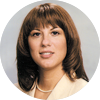First, before you pick up the phone put a smile on your face. This will give your voice an "up" tone. It is vital that the person calling your office feels that your clinic wants to be of service; this is a warm, friendly and professional office in which to receive health care.
Attempt to pick up the receiver on the second or third ring. If you pick up the phone on the first ring, you may appear too anxious. If you do not pick up the phone until the fifth ring, you may appear too busy to take their call. Be sure your clinic has an answering machine, and that at the start of each business day you have turned off the machine or switched the machine to pick up after six or more rings.
I recommend that the CA state the doctor's name. If there is more than one doctor in your clinic, state the name of the clinic. Then always give your name.
(For example, with a smile): "Dr. Gold's office, this is Rose speaking."
If your clinic is answering the phone with, "We are having a great day at Dr. Gold's clinic. This is Rose. Can I help you?", or "We are having a terrific Tuesday at Gold Chiropractic Center. I'm Rose. May I help you?" These are all fine, as long as CAs smile, state the name of the doctor or clinic, and identify themselves.
When a caller inquires about making an appointment, I recommend the CA asking the patient, for example: "When was your last patient appointment with Dr. Gold?" I have consulted in clinics where CAs ask: "Are you already a patient in this office?" or "Have you been to our office before?" or "Are you going to be a new patient in the clinic?" Callers who are long-time patients may feel put out by such questions. The "When was your last appointment with Dr. Gold?" question covers all the bases. It determines if the patient is active, new or a reactivation. This question also helps "weed out" salespeople attempting to schedule an appointment without the doctor's knowledge. From this one simple question, you will be able to screen calls and determine what scheduling script to refer to next.
It's now time to take control of the conversation. The CA should give the caller controlled choices. Give the caller two choices at a time; for example: "Morning or Afternoon?" "Early morning or late morning?" "The doctor has 8:00 AM or 9:30 AM available. Which do you prefer?" Never allow the patients or other callers to tell you how to administer the scheduling of the clinic. Once you lose control, it is difficult to regain it, so stand tough.
Keep a running phone log. I recommend one that makes a carbonless copy. All incoming and outgoing calls should be written here. This way, clinic communications will be noted for all staff members to refer to, either during a break in the day or two weeks later, if needed. When supplies are ordered, I suggest that staff also note these in the phone log, for easier tracking.
Be excited when the phone rings. A busy phone means a busy practice, and a busier practice means a healthier community in which to live. The telephone is a true lifeline for your clinic, so do not mishandle it. Do not lose control of it, and be the best communicator you can for your doctor. A CA's telephone skills can either help build a successful practice or cause it to go flat.
Until next time, CAs, go out and make a difference.
Rose Jacobs
Chesterfield, Missouri
http://home.earthlink.net/~rjocabs/
A printable version of Ms. Jacobs' article is available on line at http://www.chiroweb.com/columnist/jacobs/ You may also leave a message or ask a question at her "Talk Back" forum at the same location.
Click here for previous articles by Rose Jacobs, CA.





